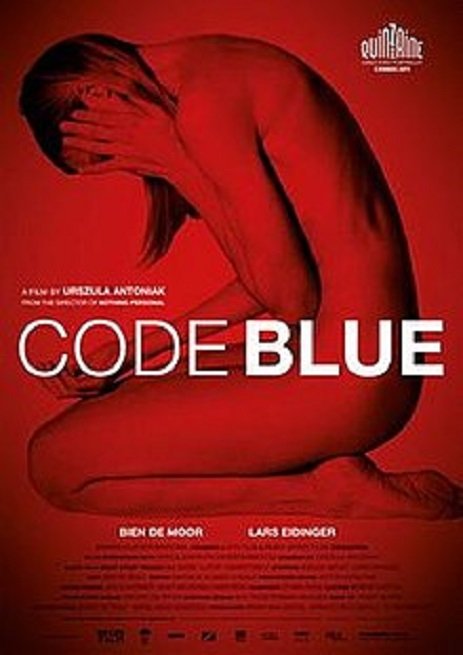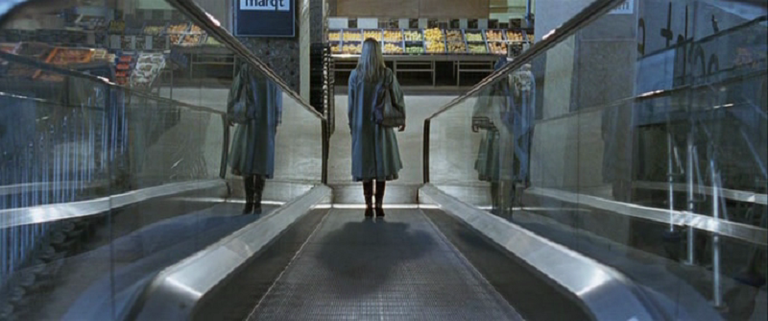In Urszula Antoniak's "Code Blue" from 2011 there is no shortage of weird content. The main heroine, Marian, is a 40 year old nurse in a ward for incurable patients. Take care of the dying patients with a lot of dedication and live ascetically. There is no family or any personal life, the walls are white in her home, her belongings still in boxes, sleeping on a mattress on the floor. When she judges that entrusted to her does not make sense to live into intolerable pain, she injects them deadly. It seems satisfied with its precise routine, but the hidden desires gradually find a way to get to the surface. After being busy with an unknown man on the bus, she watches him next to a video library and picks up the movies he has returned.

One evening Marian becomes a witness of brutal rape. From the window of her home she silently watches the merciless scene, but she is not the only one. For a moment she moved her gaze and saw the stranger she had recently followed. He lives in the building against hers and also looks absent-minded. When he finds that he noticed it, he shrugged away from the window and hid behind the curtains. A few days later they both meet by chance at a party organized by a common acquaintance and leave together. What happens in Marian's house between them can only be described as indescribable, but briefly, her neighbor has as much unresolved problems as herself. "Code Blue" is a pretty ruthless movie. It shows death and despair in the hospital where Marian works, regardless of whether it will hurt someone's feelings. It is fairly easy for the viewer to hate this lonely, secretive and ultimately cruel woman who, on top of all, feels she is an angel of good because it delivers people out of their suffering. He does it without anyone asking for it, and in one of the cases when a patient realizes what he injects, the two begin a physical struggle. Perhaps the most difficult viewing scene is that where Marian goes to the scene of the rape and finds the condom used by the abuser. She takes it, and when she returns to her apartment she masturbates, spreading the seed liquid on her body.
At this point, it would be logical to feel a strong reluctance to watch the movie. Such a reaction is not a sign of weak cinema angels - just not everyone likes the extremes of the screen. There are ways to reach convincing messages with less extreme means, I guess. I have already mentioned that I also fall into horror when I am flooded with images and scenes packed into the plot for no clear reason. Here, however, I would dare to say that the hard-to-see content serves the main purpose of understanding Marie's better through her actions. This is because "Code Blue" have been minimized and, among other things, we have no information about this unusual nurse. Why does she claim to have a daughter and even show her picture of her colleague, but never see her? Is there a reason for Marian to live in unboxed boxes and to avoid worldly pleasures? Urszula Antoniak prefers to leave all these questions unanswered, and we can only speculate about the heroine's motivation for her actions. That is why the condom scene is important. Marian is a sophisticated and mysterious character, but from what she does, we understand that she has probably had serious, unhealed wounds in the past. Perhaps she has experienced an indescribable trauma, maybe she's just emotionally and mentally unhealthy at birth ...

"Code Blue" is shown at the Cannes Festival in 2011 and is the second Antoniak 's film. From the claustrophobic way of shooting, the silence and the whiteness that prevail in the film, there is surrealism and metaphysics. He senses the presence of death, both as an end of life and as a lack of life in a full, full-blooded way. Because some of us die long before our bodies. Bien de Moore's sharp and interesting features add extra coolness and mystery to the image, and the scenes of nudity, self-deception and madness, in which she throws fearlessly, are played well. I can not say that "Code Blue "changed me forever or was a subliminal experience. When we look at such a heavy film, which at first looks like a soulless film, it is important to know what is important to us. Are we at all costs needing a hero to whom we can sympathize and whose well-being we grip our fingers? Or we can relax and immerse ourselves in the study of characters that not only do not understand but also condemn frankly. It would be unreasonable to say that one way of watching is more correct than the other. Here we focus on individual cinema requirements. Still, I can certainly say that if you give a chance to "Code Blue", you will put your senses into an interesting experiment, and this is quite exciting in itself.
The film begins with beautiful and mesmerizing music, it seems that something unusual, tragic, maybe about love awaits ahead? I watched the film to the end, and I had a strange feeling, whether the topic raised in this film does not concern anyone, or our viewer pushes the ill-fated word "arthouse". The film is complex, the idea of loneliness, which ends with a tragedy for the heroine, loneliness, pushing for extravagant deeds. The thirst for love, like water and food, otherwise you cannot say. Certainly, the viewer is different, no one will make you look or read what your mind rejects. Faced periodically with literature on psychopathology, I can confidently say "Code Blue" is a sketch of that most lonely, unhappy, rejected personality. The elderly, lonely, almost crazy, unfortunately these women are becoming more and more. Loneliness and lack of love, that's what drives us to madness, takes away mental and physical strength. I think a movie about it.
No one to look at will not advise, and yet it is a very strong and beautiful film, albeit painful.
wow amazing dear.
You have recieved a free upvote from minnowpond, Send 0.1 -> 10 SBD with your post url as the memo to recieve an upvote from up to 100 accounts!